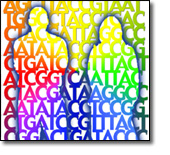Last updated: May 08, 2012
2007 News Feature Researchers Can Now Apply For Access To Data From Csp
Researchers Can Now Apply for Access to Data from NHGRI Cancer Sequencing Projects
 The National Human Genome Research Institute (NHGRI) is now accepting requests from researchers who want access to a wide range of data from two cancer sequencing projects being conducted as part of its Medical Sequencing Program.
The National Human Genome Research Institute (NHGRI) is now accepting requests from researchers who want access to a wide range of data from two cancer sequencing projects being conducted as part of its Medical Sequencing Program.
The goal of the Medical Sequencing Program is to harness the power of NHGRI's large-scale sequencing centers to help turn DNA sequencing into a tool for clinical research and medical practice for a broad range of diseases. Both cancer sequencing projects have been supported by NHGRI to tackle the unique challenges associated with using high-throughput DNA sequencing to characterize tumor genomes.
The first, called the Tumor Sequencing Project (TSP), is a multi-site effort to identify mutations and variations in genome region copy number in nearly 200 well-annotated adenocarcinomas of the lung. The second project is evaluating two different sequencing technology methods for analyzing 37 genes in a collection of 20 brain cancer (glioblastoma) tumors. Researchers may request access to data from both cancer sequencing projects by going to Data Access Request.
The knowledge gained from these projects will also be used to inform The Cancer Genome Atlas (TCGA) [cancergenome.nih.gov] pilot project, which is jointly sponsored by NHGRI and the National Cancer Institute (NCI). The process by which researchers can request access to TCGA data will be announced later this summer.
"Our hope in making these data widely available is that researchers will take advantage of the molecular information describing the genomic changes in these cancers to accelerate our understanding of the disease," said Mark Guyer, Ph.D., director of NHGRI's Division of Extramural Research. "Ultimately, sequencing for medical purposes will lead to improvements in how we prevent, diagnose and treat many human diseases."
There are two levels of access for researchers who want to view the data from the cancer sequencing projects. The first is open-access, which means the data are available to anyone without restriction. The second level of access is controlled-access which requires researchers to be pre-authorized. A table describing the types of data available at each access level is available at www.genome.gov/Cancersequencing**.
Some clinical information is available in the open database. However, no personal identifiers such as names are contained in the database and all links to personal information have been irreversibly removed. Most of the open-access data is available from the NCI Center for Bioinformatics [ncicb.nci.nih.gov], while the DNA sequences can be obtained from the National Center for Biotechnology Information (NCBI) Trace Archive [ncbi.nlm.nih.gov].
The controlled-access database will allow qualified researchers to download individual-level genotype and assembled DNA sequence data - information that can be unique to an individual subject. Although personal identifiers are removed from the samples used for cancer sequencing projects, concern remains that it may someday be possible to identify someone based solely on their genetic profile. Consequently, to protect participants who have donated tissue samples to the cancer sequencing projects, only researchers who agree to conditions for data use, including not attempting to identify individuals in the database, will be given access to the data.
To access the controlled database, the principal investigator and a signing official at the investigator's institution must co-sign an electronic request for data access, which requires an agreement to the terms and conditions for data use specified in the Data Use Certification. To complete these steps, both the principal investigator and signing official must have current accounts or apply for accounts with NIH eRA Commons [commons.era.nih.gov], the online system used to apply for NIH grants. Each data access request will be reviewed by an NHGRI Data Access Committee.
A complete list of the NHGRI Medical Sequencing Program's procedures and policies is available at Medical Sequencing Policies.
** Editor's Note: On August 12, 2010, the Cancer Sequencing Project page was taken down and is no longer active.
Last Updated: May 8, 2012
